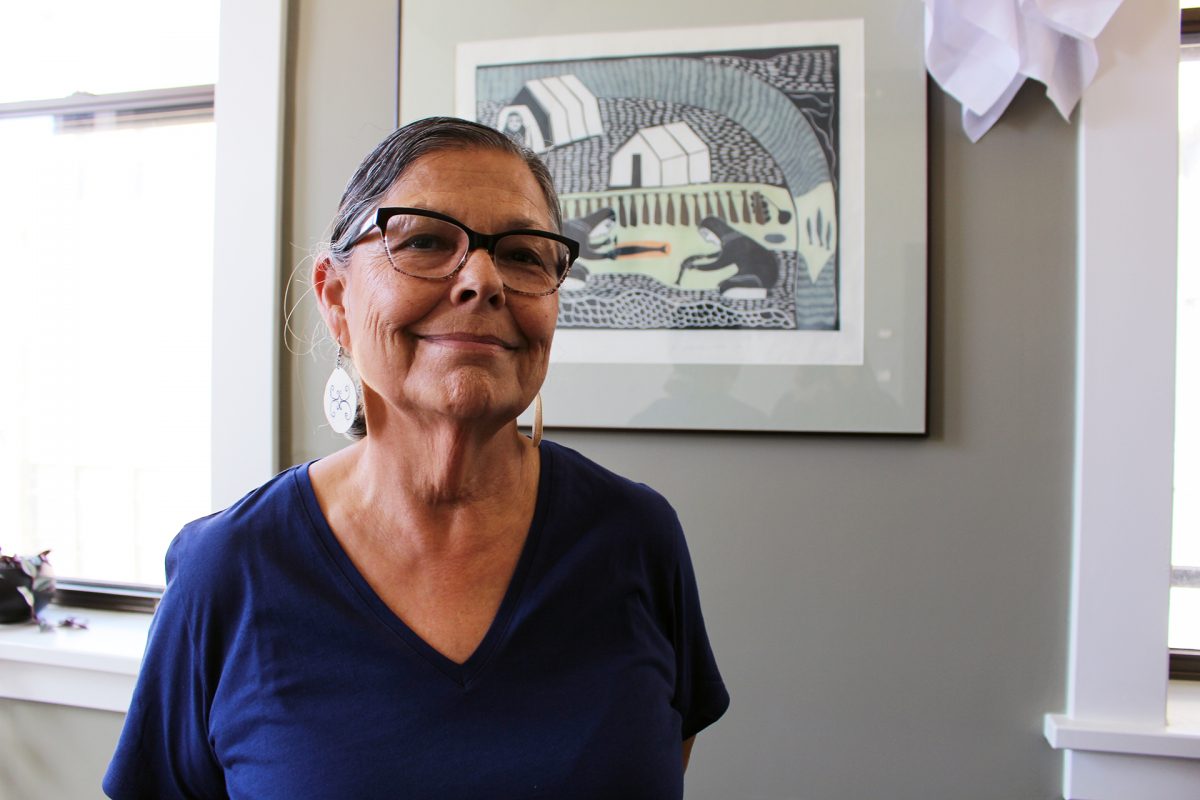
“Storytelling is really critical," says Knowledge Keeper Leslie Spillett, "It takes a lot of trust but has such an impact on how we see and relate to each other."
Stand in your power
Ongomiizwin welcomes a new Knowledge Keeper
Leslie Spillett, the new Knowledge Keeper at Ongomiizwin, wants to create a system where Indigenous people don’t just survive, but thrive.
Spillett, who started in May, describes a Knowledge Keeper as someone chosen by the community and who honours, builds and supports that community. They use their own story and understanding of life in a way that resonates with people at different stages of development in their lives. Knowledge Keepers also provide guidance and traditional knowledge relating to ceremony, identity and connections.
Heart and home
Spillett grew up in northern Manitoba near Wekusko Lake. She and her sister were raised by a Cree mother who gave them freedom to explore and live a life close to the natural world. Later, she left home to attend Catholic boarding school, then studied journalism and administration at the Southern Alberta Institute of Technology. While there, she attended summer camps organized by the Nakoda people in Morley, AB, which contributed to her identity and development as a young person.
After graduating, she returned to northern Manitoba to work as a journalist, travelling to nearly every community and meeting many people along the way. She moved to Winnipeg in 1977, but says her “heart and home” are still in northern Manitoba.
“When I drive past Grand Rapids, there’s a feeling I get of being home. I grew up by the lakes, rivers, rocks and trees. That’s what resonates with me. It is where my ancestors are buried.”
Spillett began connecting with her cultural roots and to sundance, eventually making the Pipestone, MN Gathering of the Sacred Pipes and Spruce Woods Sundance Lodges her home base.
“After having babies, I rebirthed myself in that lodge in terms of how I connected spiritually. I deepened my understanding of my place and what my purpose and role was in the community,” she said.
In 2001, Spillett founded the organization Ka Ni Kanichihk, which offers programming and services to Winnipeg’s Indigenous community.
Unlearning and relearning
What drew Spillett to the Knowledge Keeper role were the stories she heard from Indigenous people about not feeling safe, respected or believed when interacting with the health-care system. There is still resistance from the medical establishment, she says, when it comes to acknowledging systemic racism.
“It is to try to ensure that when our people come here, their health outcomes are just as good as anybody else. So how do you do that? You train people to think differently.”
Spillett believes education is the key to transforming the culture. Professionals must be trained to identify when they’re making assumptions, then step back and reevaluate.
“People in non-Indigenous communities have also had a colonial experience, they are conditioned in a particular way with respect to Indigenous people. They have a lot to unlearn and re-learn as well.”
Sharing stories
Spillett says her priority is to connect with people. She wants to support students and create understanding within the Rady Faculty of Health Sciences through personal and community narratives.
“Storytelling is really critical, people sharing their stories. It takes a lot of trust but has such an impact on how we see and relate to each other.”
Spillett clearly enjoys connecting with students, speaking enthusiastically of a sharing circle she attended with Ongomiizwin Elder Margaret Lavallee and students from the faculty preparing to go to First Nation communities as part of their training.
“It was interesting to hear their fears and what was weighing on them as they prepared to go. That’s really exciting. We were there to give them confidence and calm their anxieties.”
Stand in your power
Indigenous people know what they need, Spillett says, and the belief they need to be saved or changed has only created more problems. “The colonial project was all about disempowerment or control, which created a lot of harm,” she says, “to change it you need to stand in your power.”
Indigenous people should have the opportunity to use their own practices, she says, and creating safe spaces for them to do so will help balance the power. Spillett is optimistic that Indigenous knowledge systems, institutions, and methodologies will one day be seen as equal to western knowledge.
Spillett is proud to see how Indigenous people are rejuvenating and reviving their culture. She credits her people and their ancestors for their strength, courage and power.
“I don’t want our people to survive – I want our people to thrive and flourish and be exactly who they are, however they identify themselves. In lots of institutions, people don’t feel like they’re welcomed. It’s about creating spaces of safety for our people so we can celebrate who we are and love who we are. Love, heal, laugh, grow and just be people.”
June 21 is National Indigenous Peoples Day. Ongomiizwin will host the celebrations at the Bannatyne Campus in the Medicine Garden on June 20 with a pipe ceremony, teepee construction and display, activities, performers, and food. Spillett will read The Water Walker by Joanne Robertson for a children’s storytime. Click here for the full event schedule.






